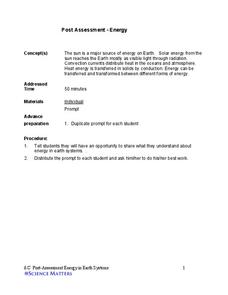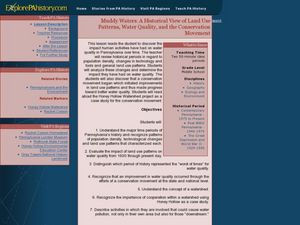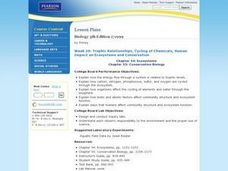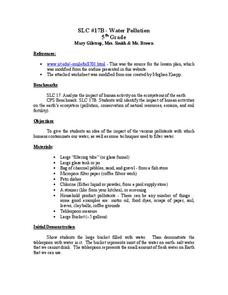SF Environment
Pre-School Composting and Recycling!
You can never be too young to get involved in composting or recycling. Here is a lesson that has been made for the very littlest learners and it's all about the importance of conservation. They'll sort compostable and recyclable objects,...
Annenberg Foundation
Teaching Geography: Workshop 4—North Africa/Southwest Asia
Can Jerusalem be equitably organized? Can Israel and Palestine be successfully partitioned? Part one of a two-part workshop looks at the geo-political history of Jerusalem while Part two investigates Egypt's dependence of the Nile River...
Curated OER
Energy Crossword Puzzle
In this energy crossword worksheet, students read 36 clues pertaining to energy conservation. Students fit their answers in a crossword puzzle. There is no word bank.
Curated OER
Water Web
In this water web worksheet, students explore, analyze and discuss how weather stations interact with maintaining weather conditions and answer two essay questions and ten multiple choice questions.
Curated OER
Desert Water Keepers
Students experiment with models to find how plants survive in the desert environment. In this plant mechanisms activity, students make leaf models to understand how leaves conserve water. Students collect cactus in bags and observe the...
Curated OER
The Water Cycle
Students develop a better understanding of the need to conserve our renewable resources. In this water cycle lesson students take notes, complete a guide sheet and illustrate the water cycle.
Curated OER
Models of the Water Cycle
Students describe and review the stages in the water cycle. In groups, they build their own models of the water cycle and demonstrate where the water goes in a closed system. They answer discussion questions after the experiment to end...
Curated OER
Activit #2 Matter: Is It Conserved?
Students support the law of conservation of matter with evidence. They discuss the changes observed from the burning of the candle, and the differences in mass which are observed when the same reaction is carried out in an open or...
Curated OER
Water Wars: Responsibility in the Age of Globalization
Learners explore the concept of water as a resource and as a human right. For this conservation lesson, students record and chart personal water usage and consumption then brainstorm ways in which to responsibly reduce water waste.
Curated OER
Water, Water Everywhere
Students observe and describe ways water is used in their homes and communities. They determine the source of their water. Students determine ways they can save and protect their water.
Curated OER
Drip, Drip, Drip or The Case of the Leaky Faucet
Students explore the cost of wasted water. In this math lesson, students conduct an experiment in which they collect data on how much water is lost when a faucet leaks. Students figure the cost of the water that was wasted.
Curated OER
Wanted: Water!
Students determine what percentage of the Earth is water and how much water is needed by humans.
Curated OER
Water Has Many Uses
Students research the uses of water and complete related activities. In this water uses lesson plan, students investigate the ways their family uses water. Students complete a collage activity, an illustration activity, a trace activity,...
Cornell University
Predicting Chemical Reactions
Prove the Law of Conservation of Mass through a lab investigation. A well-designed instructional activity asks groups to combine materials and monitor indicators for chemical reactions. Measuring the mass of the reactants and products...
Serendip
How Do Biological Organisms Use Energy?
When an organism eats, how does food become energy? Young biologists follow glucose through the process of cellular respiration to the creation of ADP using a discussion-based activity. The resource also highlights conservation of mass...
EngageNY
Paraphrasing and Evaluating Sources: Pages 112–116 of The Big Thirst
Agriculture and water—it's a fine balance. So how exactly do industry and agriculture currently manage water? Pupils consider the question as they continue reading excerpts from Charles Fishman's The Big Thirst and adding notes to their...
Science Matters
Post-Assessment Energy
After nine lessons and activities about energy, here is the final assessment. The 20-questions include multiple choice, multiple choice with justification, short answer, answer analysis, and labeling diagrams to challenge learners.
Curated OER
Muddy Waters: A historical view of land use patterns, water quality, and the conservation movement
Students research the impact that human activity had on Pennsylvania's water supply over time. In this water quality lesson plan, students research, discuss, and write about how Pennsylvania's water quality has been affected and what...
Curated OER
Trophic Relationships, Cycling of Chemicals, Human Impact on Ecosystems and Conservation
Learners explore how the energy flow through a system is related to trophic levels. They investigate how organisms affect the cycling of elements and water through the biosphere. Students participate in lab activities to observe ways...
Curated OER
Watch Your Water Use
Students record their freshwater usage over a period of a week. They calculate the amount of water used for all water activities such as brushing teeth, flushing the toilet, showering, and washing the dishes. They use an online tally to...
Curated OER
Water Unit
Students explore ways to conserve water. After discussing water, its uses, and importance, students perform an experiment to discover how much water can be used when using a sponge. After creating water artwork, students determine how...
Curated OER
The Impact of Water Pollution on Global Peace
Tenth graders participate in hands-on activities that require them to consider the implications of water pollution. In this environmental stewardship lesson, 10th graders conduct 6 experiments pertaining to water pollution and discuss...
Curated OER
Water Pollution
Fifth graders investigate how humans pollute the water supply with a number of different contaminates. While working in small groups they examine screening, sedimentation, filtration, and chemical treatments as methods of water treatment.
Curated OER
Are You Thirsty? The Effects of Pollution on Drinking Water
Discuss the availability of clean, plentiful water and the causes of water pollution. In groups, sixth graders discuss problem-solving methods for keeping water clean. They explore the function of water treatment plants and perform...

























